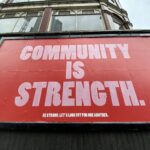Today we continue to explore the question of, “What the November 2024 election will mean to our country’s future?” What will this election mean for our nation’s progress in becoming a multi-racial/multi-ethnic democratic nation? If this season brings progress in respecting each other and working together, we can make progress on our many other issues.
For many there is a weariness about our political discourse, our progress on racial justice, and why the connection requires attention. One of the places I turn when situations seem intractable and overwhelming is the wisdom and principles of Twelve Step Recovery. Please consider the following principles.
A recent post raised the question of how white people of faith respond to those who preach and teach white supremacist Christianity. Last week I offered another perspective on engaging with others from Mark Docken. This week and periodically, I will offer ideas and actions that encourage us all to look beyond our frustrations toward a multi-racial democracy that offers liberty and justice for all.
Considering the Serenity Prayer. This simple prayer was written around 1932 by a New York-based theologian Reinhold Niebuhr as the ending to a longer prayer. The short version, introduced to A.A. members after it appeared in the New York Herald in 1941, states: “God, grant me the serenity to accept the things I cannot change; the courage to change the things I can, and the wisdom to know the difference.”
This prayer is particularly helpful in avoiding two extremes – grandiose thinking that I am responsible to “change the world”, and letting my despair lead me to giving up and doing nothing. The wisdom comes from pausing and listening to my intuition and being willing to say no to many possibilities that aren’t in my power to influence. While not often comfortable, I use the gift of writing as one way to make a contribution to changing things I care about.
A related principle is to “let go of the results”. As a person of faith, I rely on my belief that there is a force for good, despite all the evidence to the contrary. I believe love is bigger than fear and hate and there is more love in the world than I often see or realize. Letting go of specific outcomes for most Twelve Step members means believing and trusting there is a power greater than me, a Higher Power. We trust our sobriety and recovery from other addictions and their impacts to this Higher Power which each person chooses.
The word “prayer” shows up frequently in Twelve Step guidance. It is not the prayer of any particular faith or religion. Rather it is the desire for good, the desire to love in each of us manifest as each chooses in relation to some other Power. Bill Wilson, the co-founder of Alcoholics Anonymous, writes often about the benefits of “pausing when agitated or confused”. This pause allows an opportunity to look for how fear and ego may be clouding judgments or decisions and to connect with higher self/ higher power, intuition for some.
We do regular self-examination to better see our motives and hopefully to choose to act from love and compassion. Again, Wilson sums up the benefits of this approach this way: “There is a direct linkage among self-examination, meditation and prayer. Taken separately, these practices can bring much relief and benefit. But when they are logically interwoven, the result is an unshakeable foundation for life.” (Twelve Steps and Twelve Traditions, p.98)
This may all seem a long way from applying our faith to concerns like the national election. Without “guidance”, it is easy to get lost and lose hope. I get this guidance from my individual practices and from being part of a community.
Twelve-Step recovery works best through being part of a group and regularly attending meetings. There are many benefits from being in a group of people with a shared purpose. Among the benefits I find most helpful are the feeling of identification and not being alone. I hear other views and seek group wisdom and group energy. I will explore the benefits of Twelve Step groups as well as different opportunities to work with groups committed to connecting faith with the work for racial justice in future posts.
What practices guide you in deciding where to use your talents and energy in these complex and challenging times?




Good thoughts Tom
Thanks Jon, appreciate you weighing in. Best.